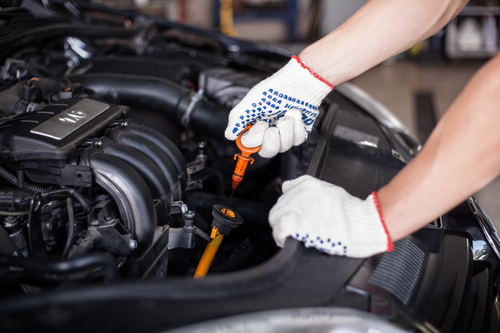To maintain your vehicle in the best possible condition, there are a number of preventative auto maintenance services that need to be done. With the vehicles of today, it’s more important than ever to make sure your auto maintenance is done on a regularly scheduled basis. Lack of maintenance can leave you open to your vehicle breaking down unexpectedly and leaving you stranded.
Some preventative auto maintenance you can do yourself depending on your knowledge and abilities and some preventative auto maintenance should be done by a professional.
Check Your Oil
Check your oil frequently to make sure it’s full and none needs to be added. Once a week is a good idea. Check when the engine is cold and on a flat surface. If the level is down to the fill mark, add oil and take it to your mechanic to have it checked. At the same time you should check the ground underneath to be sure there is no leakage on the ground. Have your oil and filter changed per your vehicle manual or every 3000 to 4000 miles. On many cars, different weights of oil should be used depending on weather and other factors.
Check Fluids
Check your water/coolant level, brake fluid and transmission fluid. Make sure your anti freeze/coolant is at the correct level for your area.

Check Tires
Check tire tread and make sure there is enough air in them. Also check to be sure they haven’t gotten damaged.
Check Hoses and Belts
Check belts for wear and damage. Check hoses for wear, damage and a good connection.
Check Brakes
With the motor running, check brakes for any softness, squealing, grating or grinding.
Check Windshield Wipers
Make sure they’re working right and the rubber piece hasn’t worn down or been damaged.
Preventative auto maintenance services are very important for safety and to avoid accidents. All of the above maintenance checks should be done on a regular basis. Oil and fluids should be done weekly so problems can be caught early.
This is where a good, knowledgeable and professional auto technician comes in. Most people don’t know how or have the time to take care of these things on a regular basis. A good auto technician will go over all of these things and probably more when you take your vehicle in for service.
If you own a business with company vehicles, it’s a good idea to put them on a preventative maintenance schedule and have them periodically checked over. This will go a long way towards preventing employee accidents.
Preventative auto maintenance services will help substantially with wear and tear on vehicles, the cost of repair and will catch most problems early. Preventative auto maintenance services will do that and it may even save a life so contact us today.
Frequently Asked Questions about Preventative Auto Maintenance
1. Why is preventative auto maintenance important?
Preventative auto maintenance is crucial for ensuring your vehicle’s longevity and reliability. Regular maintenance helps identify and fix minor issues before they escalate into costly repairs or breakdowns. It also enhances safety by ensuring all systems function properly, reducing the risk of accidents caused by mechanical failures.
2. How often should I check my oil?
You should check your oil at least once a week. It’s best to do this when the engine is cold and the car is on a flat surface. Regular oil checks help prevent engine damage by ensuring the oil level is adequate and there are no leaks.
3. What fluids should I regularly check in my vehicle?
Regularly check the engine oil, coolant, brake fluid, and transmission fluid. Keeping these fluids at optimal levels ensures your vehicle operates smoothly and prevents overheating, brake failure, and transmission issues. Don’t forget to check the windshield washer fluid as well for clear visibility.
4. How do I check my tires for wear and damage?
To check your tires, look for uneven tread wear, cracks, or bulges on the sidewalls. Use a tire pressure gauge to ensure they are inflated to the manufacturer’s recommended levels. Proper tire maintenance improves fuel efficiency, extends tire life, and enhances safety.
5. Why is it important to check belts and hoses regularly?
Belts and hoses are critical for your vehicle’s engine performance. Regular checks can identify wear, cracks, or loose connections early on. Replacing damaged belts and hoses prevents breakdowns and ensures the engine runs smoothly.
6. How can I tell if my brakes need servicing?
If your brakes feel soft, squeal, grind, or make any unusual noises, it’s time to get them checked. Regular brake inspections are essential for your safety, ensuring your vehicle can stop effectively in all conditions.
7. When should I replace my windshield wipers?
Replace your windshield wipers if they leave streaks, make noise, or fail to clear the windshield effectively. Good visibility is crucial for safe driving, especially during adverse weather conditions.
8. Can I do preventative auto maintenance myself?
Yes, some preventative auto maintenance tasks can be done yourself, such as checking oil and fluid levels, inspecting tires, and replacing wiper blades. However, more complex tasks like brake inspections and engine diagnostics should be left to professional auto technicians.
9. How does preventative maintenance affect a business with company vehicles?
For businesses with company vehicles, a preventative maintenance schedule reduces downtime and repair costs, ensuring the fleet runs efficiently. Regular checks prevent accidents, protect employees, and extend the life of the vehicles, ultimately saving money.
10. What are the benefits of scheduling regular maintenance with a professional auto technician?
Professional auto technicians have the expertise and tools to thoroughly inspect and maintain your vehicle. They can spot potential issues early, ensuring your car remains in top condition. Regular professional maintenance enhances safety, reliability, and performance, giving you peace of mind on the road.

